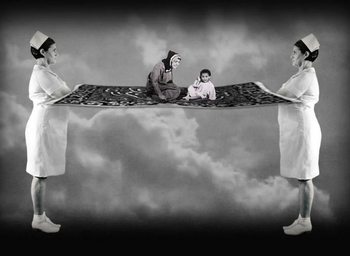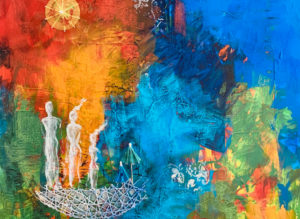The Troubling Yemenite Babies Affair: Tamar Nissim’s “Contagious Truths” Exhibit | Studio Israel
Published Oct 21, 2022

Shoshana Madmoni-Gerber On Israel's Troubling Yemenite Babies Affair
Through video and still photography, Tamar Nissim’s exhibition, Contagious Truths, explores the experience of women in the Mizrahi immigrant community in Israel, with a particular focus on the troubling stories of babies taken from their mothers in what has come to be known as the Yemenite Babies Affair.
(17 min) In this clip, Shoshana Madmoni-Gerber presents the historical context of Tamar’s work and shows us harrowing firsthand accounts of the events that occurred.
Shoshana Madmoni-Gerber is an Associate Professor of Communication and Journalism at Suffolk University and the author of Israeli Media and the Framing of Internal Conflict: The Yemenite Babies Affair.
Lisa Fishbayn Joffe is the director of the Hadassah-Brandeis Institute.
The Studio Israel conversation series was inaugurated in the fall of 2020, in partnership with the Hadassah-Brandeis Institute, the Schusterman Center for Israel Studies at Brandeis University and The Vilna Shul, and is made possible by generous support from Combined Jewish Philanthropies (CJP). Studio Israel is also cosponsored by the Consulate General of Israel to New England. This peer-led series invites audiences to join leading artists, academics, and community leaders for a panoramic journey through the landscape of Israeli art, dance, food, fashion, and more, that investigates the diversity and nuance of Israel’s variegated social, cultural, and political aspects through the lens of the arts.
This successful series returns with four new installments, spanning October 2022 to March 2023. We will continue to expand the scope and diversity of artists featured and delve more deeply into the nuances of Israeli society.
Artist Tamar Nissim, “Contagious Truths”
(9 min) In this clip, Tamar Nissim describes her work and shares her personal relationship to the subject matter.
Tamar Nissim is an interdisciplinary artist based in Tel Aviv, Israel. Guided by archival research, Nissim traces the influence of historic, traumatic events on women and children. In transforming this research into performance, video, and photography, Nissim interweaves themes of familial relationships, militarism, and nationalism with culture and politics. Centering femininity and remembering through the body, Nissim reveals non-hegemonic perspectives, raises questions about identity, and confronts women and children’s unspoken traumas from the past as she reflects on those of the present.
Tamar Nissim exhibits her work widely in national and international museums, galleries, and non-profit institutions. Recent exhibitions include Kaunas Biennial, Lithuania; Guimaraes Biennial, Portugal; Tel Aviv Museum, Israel; Museum Bat Yam, Israel; HaMiskan, Ein Harod; and Indie-Collective Gallery, Israel. Nissim holds a BA with Honors in Textile Design from Shenkar College (Ramat Gan, Israel) and attended the “Advanced Artist Program” at HaMidrasha School of Art (Beit Berl, Israel) where she earned a Master’s of Education in Art Education. Nissim received an Honorable Mention at the Guimaraes Triennial, Portugal, and is the recipient of four Rabinovich Foundation grants, and a 2019 Ha’Pais Council for the Culture and Arts Grant. Nissim is a member of Indie, The Collective Gallery for Photography, and the recipient of the Israeli Minister of Culture’s prize.
Q&A with Tamar Nissim and Shoshana Madmoni-Gerber
(27 min) Tamar and Shoshana go in great depth as they answer questions about the Yemenite Babies Affair, apologies, and creating art around a tragic event.
JArts’ mission is to curate, celebrate, and build community around the diverse world of Jewish arts, culture, and creative expression. Our vision is of a more connected, engaged, and tolerant world inspired by Jewish arts and culture.
Reflections
Reflect
Prior to watching this Studio Israel, how much did you know about the Yemenite Babies Affair?
Unpack
In the Q&A, Tamar talks about the apology of the government and the apology she made herself. What does (or should) accountability look like in this instance? What makes a genuine apology? Why did Tamar apologize? What does it mean to apologize for something you may have had no direct part of?
Want more?
Get curated JewishArts.org content in your inbox


